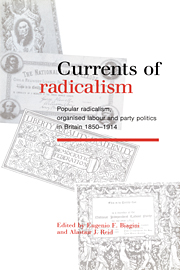 Currents of Radicalism
Currents of Radicalism Book contents
- Frontmatter
- Contents
- Notes on contributors
- Preface
- 1 Currents of radicalism, 1850–1914
- Part I Continuities in popular radicalism
- 2 The old radicalism and the new: David Urquhart and the politics of opposition, 1832–1867
- 3 Radicalism and popular culture: the Tichborne case and the politics of ‘fair play’, 1867–1886
- 4 Popular politics and the limitations of party: Wolverhampton, 1867–1900
- 5 Nonconformity and trade unionism: the Sheffield outrages of 1866
- Part II The Liberal party and the people
- Part III Radicals, Liberals, and the Labour party
- Index
4 - Popular politics and the limitations of party: Wolverhampton, 1867–1900
from Part I - Continuities in popular radicalism
Published online by Cambridge University Press: 07 September 2010
- Frontmatter
- Contents
- Notes on contributors
- Preface
- 1 Currents of radicalism, 1850–1914
- Part I Continuities in popular radicalism
- 2 The old radicalism and the new: David Urquhart and the politics of opposition, 1832–1867
- 3 Radicalism and popular culture: the Tichborne case and the politics of ‘fair play’, 1867–1886
- 4 Popular politics and the limitations of party: Wolverhampton, 1867–1900
- 5 Nonconformity and trade unionism: the Sheffield outrages of 1866
- Part II The Liberal party and the people
- Part III Radicals, Liberals, and the Labour party
- Index
Summary
This chapter adopts the case study approach to develop a detailed analysis of English popular politics in the thirty or so years between the passing of the Second Reform Act and the emergence of the Independent Labour Party in the 1890s. If the work has an underlying theme it is that, in endeavouring to recreate something of the texture and vitality of popular politics, we must focus special attention on the complex, and often deeply ambiguous, relationship between political activists – be they Liberal, Conservative or Labour – and the people they sought to represent. To many this must appear glaringly obvious: is this not everyone's common-sense understanding of the stuff of politics? And yet this basic insight has informed only a small fraction of the post war historiography of British working-class politics. The dominant approach has been to treat major political movements such as Chartism, socialism, or for that matter working-class Conservatism, as little more than the natural (i.e. causally determined) outgrowths of prior social and economic realities. Rarely has there been any attempt to understand the complex web of aspirations and identities which sustained popular political movements; in effect political history has been depoliticised.
- Type
- Chapter
- Information
- Currents of RadicalismPopular Radicalism, Organised Labour and Party Politics in Britain, 1850–1914, pp. 65 - 85Publisher: Cambridge University PressPrint publication year: 1991
- 1
- Cited by
